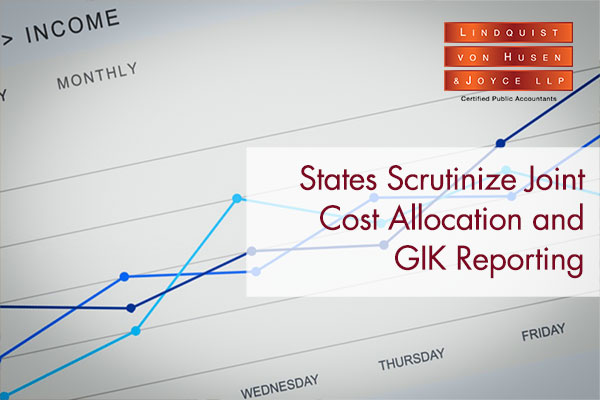
State regulators in several states, including California, are bringing enforcement actions against not-for-profit organizations, citing “materially false statements” specific to joint cost allocations reporting and gifts in kind valuations. The rules underlying these accounting and financial statement reporting activities are highly technical and, if misstated and not closely reviewed during an independent audit, can lead to enforcement actions, legal costs, damage to the nonprofit’s reputation and dire impacts on future development and programming.
With all of those concerns in mind, it’s imperative to:
- have a well-trained accounting staff and board;
- work with a CPA firm that is highly knowledgeable in not-for-profit accounting, reporting and auditing, and;
- educate development staff on proper use of financial data and programming “calls to action” in fundraising activities.
All of this seems like common sense, but an article in The Nonprofit Times noted that not-for-profit organizations can make mistakes when allocating costs between fundraising, management and programming. They also make mistakes in the acceptance, use and accounting for non-cash contributions, also known as gifts in kind contributions. When this data is inaccurate and not closely audited, it can lead to an inflation of programming expenses and revenue, but also impacts communications to donors about the ratios of funds that support programming and mission vs. administration.
“The state regulators claim that the usage of these ratios misrepresents the size or complexity of a charity’s business operations, which constitutes a deceptive fund-raising practice and violates state charitable solicitation laws.”
—The Nonprofit Times
For example, the joint cost allocation rules set forth in Generally Accepted Accounting Principles (GAAP) state that organizations are permitted to allocate a portion of expenses associated with fundraising activities to programming expense only if those activities include a “call to action” that furthers its mission. In other words, the fundraising must include some valid programming element, not just a solicitation for donations. The rules also govern who receives the solicitations. It can’t be limited to large or frequent donors.
In addition, gifts in kind donations have many rules guiding their acceptance, use and accounting. State regulatory scrutiny has focused mainly on use of donated non-cash goods, valuation, recognition of revenue and expenses, and financial statement disclosures, according to the article.
If you are concerned about your organization’s allocation of joint costs and/or accounting for non-cash contributions, it may be time for a second opinion on your accounting systems or financial statements. LvHJ’s not-for-profit accounting and business advisory team and independent auditors are here to help.
Source:
The Nonprofit Times








